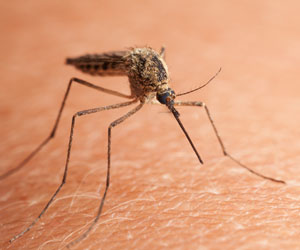- Sniffer dogs are able to identify whether a person has the malarial infection or not by smelling pieces of clothing worn by him/her
- The dogs were even able to identify children having lower levels of parasites than what is required to be present in rapid diagnostic tests established by the WHO
- Sniffer dogs may aid in malaria eradication efforts, which has resurgence in the last couple of years
Read More..
Urgent Need for New Tools to Aid Malaria Eradication Efforts
In the last couple of years, there has been a resurgence of malarial infection and related deaths despite very good success in the previous decade. There is currently an urgent need for novel tools to aid rapid and accurate diagnosis of malaria, especially in malaria prevalent areas.To achieve this aim, the current study has been undertaken with grants from the Bill & Melinda Gates Foundation, to find out if sniffer dogs with their keen sense of smell could detect malarial infection rapidly and accurately.
Can Dogs Be Trained to Sniff Malarial Infection Accurately?
- As part of the study, several hundred school children from Africa were enrolled in the trial. They were checked for general health status, tested for malaria parasites and given a pair of socks they had to wear overnight
- The following day, the socks were collected and segregated according to whether the child had the malarial infection or not (as per blood testing)
- Socks from children with malaria who had no visibly evident signs or symptoms, as well as the socks from the children who were not infected were then shipped to the United Kingdom and kept in a freezer for several months while they were being used to train the sniffer dogs
- The sniffer dogs were then trained to distinguish between socks from children with malarial parasites (but no visible symptoms) from the socks worn by uninfected children
- If they detected malaria, the dogs had to become very still, and if they did not detect malaria, they had to move on
- With just the sock samples, the dogs accurately detected 70 percent of the infected children and 90 percent of kids that were not infected
"People with malaria parasites generate distinct odors on their skin and our study found dogs, which have an incredibly sensitive sense of smell, can be trained to detect these odors even when it's just on an article of clothing worn by an infected person," according to public health entomologist Steven Lindsay at in the Department of Biosciences at Durham University UK, and the lead investigator on the study.
Success Rate Can Be Further Improved in Future Studies
According to Lindsay, there is scope for further improvement in diagnostic accuracy (up to 78%) of the sniffer dogs in future studies by addressing the following issues:- Some of the children who were identified as negative were carrying a more mature form of the malarial parasite (since the parasite underwent development in the patient’s body), whose odor the dogs were not trained to detect
- Additionally, the accuracy might be better if recently worn pieces of clothing were used instead of using frozen samples as done in the study
Scope of Study
- Useful in malaria prevalent areas to identify infected persons who are not symptomatic, since they continue to keep the infection alive within the community and should be treated promptly. Currently, the entire community has to be tested or treated to eradicate the infection
- Sniffer dogs could be used at ports of entry to detect and restrict entry of persons carrying malaria parasites. For instance, in places like Zanzibar, efforts to eradicate malaria are complicated by a constant flow of visitors arriving from the mainland where many persons are infected with malaria
- Training dogs to detect specific smells associated with malaria can give added thrust to research to develop artificial 'electronic noses' or 'e-noses' that can diagnose diseases based on specific odors
Further Research Plans
The team is planning a follow-up study to analyze clothing samples from people in various parts of Africa to identify whether malarial parasites from different parts of the continent have distinctive odors.Conclusion
Professor James Logan, Head of the Department of Disease Control, at the London School of Hygiene & Tropical Medicine concluded saying, "Our progress on the control of malaria has stalled in recent years, so we desperately need innovative new tools to help in the fight against malaria. Our results show that sniffer dogs could be a serious way of making diagnosis of people who don't show any symptoms, but are still infectious, quicker and easier."Reference:
- Dogs Can Diagnose Malaria By Sniffing Socks - (https://www.pbs.org/wgbh/nova/article/dogs-diagnose-malaria-socks/)
Source-Medindia














